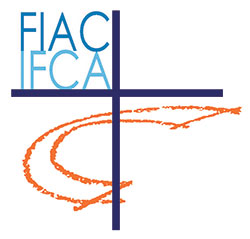Via Lucis – Via Pacis. An invitation to prayer and reflection for Easter Season Eight stages contemplating the mystery of the Resurrection following the steps of the women, the apostles with Mary, the disciples of Jesus “from the eighth day on a journey with the Risen Lord”.

For personal and communitarian prayer and reflection
In the PDF you will find this proposal for Easter Season
To follow the texts we have used in the pdf, from the liturgy of the Word of the Easter Season and from Pope Francis’ address to the Diplomatic Corps on 8 January in which he recalled so many conflicts unfortunately still ongoing with many, too many innocent victims.
Witnessing and living the joy of the Resurrection is not easy in these difficult times but we know that the Risen Christ is our hope for a world of peace: Blessed are the peacemakers
“There is a need for lay faithful who (…) live the paschal mystery with daily simplicity, who are not afraid of the cross nor of martyrdom.” Blessed Eduardo F. Pironio
VIA LUCIS
Opening song
In the name of the Father, the Son and the Holy Spirit.
a. Introduction
b. The eight stages
follow the same pattern:
the singing of the alleluia
listening to the world of God
silence
a prayer (from the Collects for the time after Easter)
1. The Resurrection of Christ
Matthew 28, 1-8 (Mark 16, 1-7) (Luke 24, 1-11)
2. The Risen Christ appears to Mary Magdalene
John 20, 1-18
3. The Risen Christ appears to the disciples on their way to Emmaus
Luke 24, 13-35
4. The Risen Christ appears to the Disciples and to Thomas (II Sunday after Easter)
John 20, 19-29
5. Jesus gives himself in the Eucharist
John 6, 30-40 and Mark 14, 22-25 (Matthew 26, 26-29) (Luke 22, 14-20)
6. The Risen Christ appears to the disciples on the Lake of Tiberias
John 21, 1-25
7. The Risen Christ ascends to heaven (the Ascension)
Acts of the Apostles 1, 1-14 (Matthew 28, 16-20) (Mark 16, 15-20) (Luke 24, 50-53)
8. The gift of the Holy Spirit (Pentecost)
Acts of the Apostles 2, 1-12; 14; 22-24
c. at the end of the eight stages there could be some comments
a. silence
b. sharing of reflections and /or invocations
c. Our Father
d. Concluding prayer
e. Final blessing
Closing hymn
VIA PACIS
From the address to the Diplomatic Corps 8 January 2024
“Blessed are the peacemakers”
One word in particular resounds in the two principal Christian feasts. We hear it in the song of the angels who proclaimed in the night of the birth of the Saviour, and we hear it again in the greeting of the risen Jesus. That word is “peace”. Peace is primarily a gift of God, for it is he who has left us his peace (cf. Jn 14:27). Yet it is also a responsibility incumbent upon all of us: “Blessed are the peacemakers” (Mt 5:9).
1. Israel and Palestine
my deep concern regarding the events taking place in Palestine and Israel. All of us remain shocked by the October 7 attack on the Israeli people(…) I renew my condemnation of this act and of every instance of terrorism and extremism (…) the attack provoked a strong Israeli military response in Gaza that has led to the death of tens of thousands of Palestinians, mainly civilians, including many young people and children, and has caused an exceptionally grave humanitarian crisis and inconceivable suffering.
2. Middle East
we cannot forget the Syrian people, living in a situation of economic and political instability aggravated by last February’s earthquake. May the international community encourage the parties involved to undertake a constructive and serious dialogue and to seek new solutions, so that the Syrian people need no longer suffer as a result of international sanctions. In addition, I express my profound distress for the millions of Syrian refugees still present in neighbouring countries like Jordan and Lebanon.
3. Myanmar
I would also call the attention of the international community to Myanmar, and plead that every effort be made to offer hope to that land and a dignified future to its young, while at the same time not neglecting the humanitarian emergency that the Rohingya continue to experience.
4. Ukraine
after nearly two years of large-scale war waged by the Russian Federation against Ukraine, the greatly desired peace has not yet managed to take root in minds and hearts, despite the great numbers of victims and the massive destruction. One cannot allow the persistence of a conflict that continues to metastasize, to the detriment of millions of persons; it is necessary to put an end to the present tragedy through negotiations, in respect for international law.
5. Armenia and Azerbaijan
I also express my concern for the tense situation in the South Caucasus between Armenia and Azerbaijan, and I urge the parties to arrive at the signing of a peace treaty. It is urgent that a solution be found to the dramatic humanitarian situation of those living in that region, while favouring the return of refugees to their own homes in legality and security and with respect for the places of worship of the different religious confessions present there. These steps will help contribute to the building of a climate of trust between the two countries, in view of the greatly desired peace.
6. Africa
Turning our gaze to Africa, we are witnessing the suffering of millions of persons as a result of the numerous humanitarian crises that various sub-Saharan countries experience due to international terrorism, complex social political problems, and the devastating effects caused by climate change. Added to these are the effects of the military coups d’état that have occurred in several countries and certain electoral processes marked by corruption, intimidation and violence.
7. America
Although there are no open wars in the Americas, serious tensions exist between several countries, for example Venezuela and Guyana, while in others, such as Peru, we see signs of a polarization that compromises social harmony and weakens democratic institutions.
8. Nicaragua
The situation in Nicaragua remains troubling: a protracted crisis with painful consequences for Nicaraguan society as a whole, and in particular for the Catholic Church.
The path to peace calls for respect for life, for every human life,
The path to peace calls for respect for human rights
The way to peace is through political and social dialogue
The path to peace also passes through interreligious dialogue
The path to peace passes through education, which is the principal means of investing in the future and in young people.
- wps_subtitle:
- Eight stages contemplating the mystery of the Resurrection following the steps of the women, the apostles with Mary, the disciples of Jesus “from the eighth day on a journey with the Risen Lord”.
- pl_view_post:
- 565








